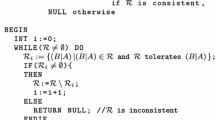Abstract
This paper introduces a new default reasoning paradigm based on Spohn's revision methodology for ranking measures, i.e. Jeffrey-conditionalization. Its main features are representation independence, robustness, strong inheritance properties together with a quasi-probabilistic justification and the satisfaction of Lehmann's postulates for preferential consequence relations.
Preview
Unable to display preview. Download preview PDF.
Similar content being viewed by others
References
S. Benferhart, C. Cayrol, D. Dubois, J. Lang, H. Prade. Inconsistency management and prioritized syntax-based entailment. In Proceedings of IJCAI 93, Morgan Kaufmann, 1993.
S. Benferhart, A Saffiotti, P. Smets. In Proceedings of UAI 95, Morgan Kaufmann, 1995.
F. Bacchus, A.J. Grove, J. Y. Halpern. Statistical foundations for default reasoning. In Proceedings of IJCAI 93, Morgan Kaufmann, 1993.
D. Dubois, H. Prade. Possibility Theory. Plenum Press, New York 1988.
D. Gabbay. Theoretical foundations for nonmonotonic reasoning in expert systems. In Logics and models of concurrent systems, ed. K.R. Apt. Berlin, Springer-Verlag, 1985.
H. Geffner, J. Pearl. Conditional entailment: bridging two approaches to default reasoning. Artificial Intelligence, 53: 209–244, 1992.
M. Goldszmidt, P. Morris, J. Pearl. A maximum entropy approach to nonmonotonic reasoning. In Proceedings of AAAI 90. Morgan Kaufmann 1990.
S. Kraus, D. Lehmann, M. Magidor. Nonmonotonic reasoning, preferential models and cumulative logics. Artificial Intelligence, 44: 167–207, 1990.
D. Lehmann. Another perspective on default reasoning. Technical report TR-92-12, Hebrew University, Jerusalem, 1992.
D. Lehmann, M. Magidor. What does a conditional knowledge base entail ? Artificial Intelligence, 55:1–60, 1992.
D. Makinson. General patterns in nonmonotonic reasoning. In Handbook of Logic in Artificial Intelligence and Logic Programming (vol II), eds. D.Gabbay, C. Hogger. Oxford University Press, 1994.
J. Pearl. System Z: a natural ordering of defaults with tractable applications to nonmonotonic reasoning. Proc. of the Third Conference on Theoretical Aspects of Reasoning about Knowledge. Morgan Kaufmann.
W. Spohn. A general non-probabilistic theory of inductive reasoning. In R.D. Shachter et al. (eds.), Uncertainty in Artificial Intelligence 4, North-Holland, Amsterdam 1990.
E. Weydert. Qualitative magnitude reasoning. Towards a new semantics for default reasoning. In J. Dix et al. (eds.), Nonmonotonic and Inductive Reasoning. Springer-Verlag 1991.
E. Weydert. Plausible inference for default conditionals. In Proceedings of ECSQARU 93. Springer, Berlin, 1993.
E. Weydert. General belief measures. In Tenth Conference on Uncertainty in Artificial Intelligence. Morgan Kaufmann, 1994.
E. Weydert. Defaults and infinitesimals. Defeasible inference by nonarchimedean entropy maximization. In Eleventh Conference on Uncertainty in Artificial Intelligence. Morgan Kaufmann, 1995.
E. Weydert. Default entailment. A preferential construction semantics for defeasible inference. In Dreschler-Fischer, Pribbenow (eds.) Proceedings of KI-95. Springer-Verlag 1995.
Author information
Authors and Affiliations
Editor information
Rights and permissions
Copyright information
© 1996 Springer-Verlag Berlin Heidelberg
About this paper
Cite this paper
Weydert, E. (1996). System J — Revision entailment. In: Gabbay, D.M., Ohlbach, H.J. (eds) Practical Reasoning. FAPR 1996. Lecture Notes in Computer Science, vol 1085. Springer, Berlin, Heidelberg. https://doi.org/10.1007/3-540-61313-7_106
Download citation
DOI: https://doi.org/10.1007/3-540-61313-7_106
Published:
Publisher Name: Springer, Berlin, Heidelberg
Print ISBN: 978-3-540-61313-8
Online ISBN: 978-3-540-68454-1
eBook Packages: Springer Book Archive




